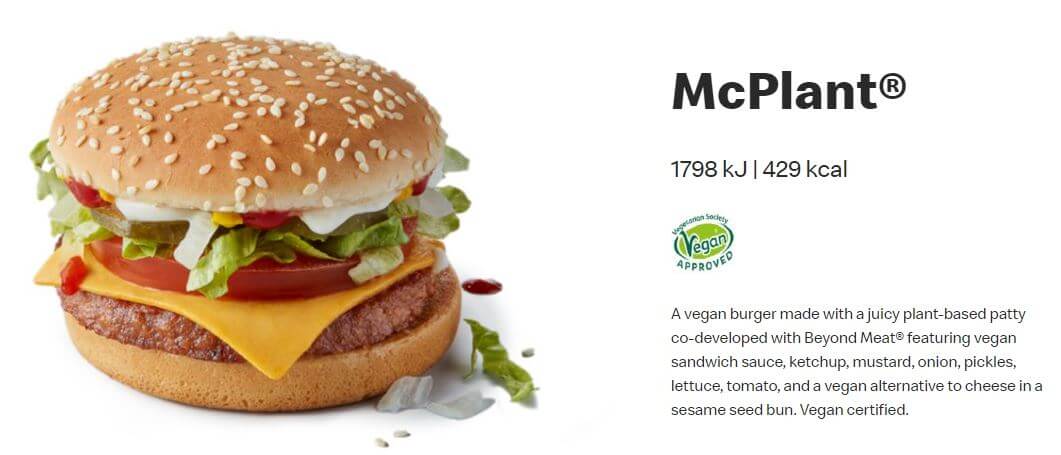
Why is the UK so vegan-friendly?
Why is the UK so vegan-friendly?
Compared to the US, the UK is ahead of the game when it comes to plant-based foods and their popularity, VegNews reports. Let’s see why!
The UK is a veritable plant paradise
Right now, if you were to walk down any high street in the UK, you’d find a vegan menu in most restaurants. It’s only natural now that many independent restaurants offer delicious plant-based dishes, but vegan food in the UK is not on the periphery. You can also find vegan food in mainstream, popular fast food and coffee chains such as McDonald’s, KFC, Burger King, Pizza Hut, Subway, Starbucks, Krispy Kreme and Greggs. And beyond fast food, the country’s biggest grocery chains from Aldi to Tesco to Sainsbury’s also offer their own plant-based foods. When we write this, we’re not just talking about tofu, but plant-based bacon, tuna, ham, steak, nuggets, burgers, sausages and more.
Things are improving in the United States, but the situation is not the same. The McDonald’s offer is a perfect example. In the UK, you can order a McPlant meal with fries and veggie fingers. In the US, on the other hand, you can’t even get fries that are classed as vegan because they are beef-flavoured. That doesn’t mean America doesn’t have something to be proud of when it comes to plant-based innovation. After all, the plant-based meatloaf in the UK’s popular McPlant is made by Beyond Meat, a Californian company.
Size matters too
Part of the difference comes down to size. The UK is significantly smaller than the US. That makes it much easier for organisations like Veganuary – which encourages people to give up animal products for a month – to build momentum and keep it going.

However, two British experts, Matthew Glover, activist, entrepreneur and co-founder of Veganuary, and Maisie Stedman, PR Officer at The Vegan Society, shared more information in an interview with VegNews.
The plant-based food industry is bigger than ever in the UK. Why?
Matthew Glover says Veganuary has played a key role in the significant growth of the UK plant-based food industry over the past decade. Retailers, restaurants and food manufacturers have wholeheartedly supported this initiative, introducing new products and menu items. The creation of a month dedicated to veganism and plant-based diets, which has become widely known, has profoundly transformed the UK food sector. Vegan food has gone mainstream.
Maisie Stedman added that there are many reasons behind the rise of veganism. More positive media coverage has helped to change the image. Documentaries showing the shocking realities of animal agriculture have come to the fore; peaceful activists are educating the public about veganism on the streets and in schools; supermarkets and restaurants offer convenient, delicious vegan meals; delicious vegan recipes have proliferated online and on social media as society becomes more health-conscious; and elite vegan athletes continue to prove that you can be fit and healthy on a plant-based diet.
There are more vegans than ever in the UK, but plant-based foods are not the only choice, as vegans are becoming more resilient. Why is this?
In recent years, discussions about the environmental impact of meat consumption have become commonplace, and as a result many people are choosing to reduce their consumption of animal products. They can walk into any supermarket with a huge selection of plant-based products or into any restaurant with an exciting vegan menu.
The US plant-based food industry is growing, no doubt, but not as much as in the UK. Why is there such a difference?
According to Glover, Veganuary has not had such a transformative impact in the US, partly because of the country’s huge size and limited resources, but also because the meat lobby’s influence is stronger there. Misinformation campaigns and legal challenges pose significant barriers to the plant-based food industry. However, the US is leading the way in food technology innovation, with companies such as Beyond Meat, Impossible Foods and Eat Just ahead of their UK and European counterparts.
Which countries in Europe are currently the best?
“Germany, Denmark and the Netherlands are making significant progress in embracing plant-based foods and innovation,” said Glover. “While challenges remain, the dialogue around meat reduction in these countries is less polarised. There is a growing acceptance at both social and institutional levels of the need to reduce meat consumption.
Stedman added that veganism is spreading across Europe. Meticulous Research reports that 2.6 million people in Europe are currently vegan in 2023, representing 3.2% of the European population, and that since 2020, according to The Good Food Institute, sales of plant-based foods in Europe have increased by 22%. According to the Smart Protein Project, the largest flexitarian populations are found in Germany (40%) and Austria (37%), where omnivores are no longer typical. And in the Netherlands, 35% of consumers identify as flexitarian.
It is also worth taking a look at the results of the NÉGYOSZ 2023 survey, published under the title How Hungarians perceive plant-based diets and foods!
In some countries, as well as in others, certain generations are at the forefront of choosing and adopting plant-based foods.
Now younger generations, especially urban ones, are at the forefront of change in the UK. As with global trends, socially liberal, environmentally and social justice-minded individuals are driving the growth of the plant-based food market,” Glover reported.